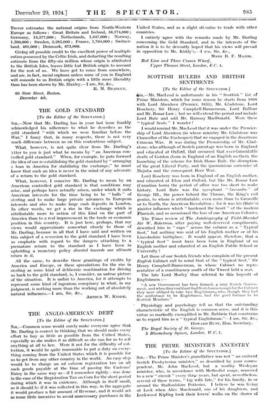THE GOLD STANDARD
[To the Editor of the SPECTATOR.] SIR,—NOW that Mr. Darling has in your last issue frankly acknowledged his adherence to what he describes as the gold standard "with which we were familiar before the War," I fancy that, in many respects, there is not very much difference between us on this contentious subject.
Mat, however, is not quite clear from Mr. Darling's letter to you is just what he means by "an American con- trolled gold standard." When, for example, he puts forward the idea of our re-establishing the gold standard by" arranging a loan in America for stabilizing the exchange," he must know that such an idea is never in the mind of any advocate of a return to the gold standard.
What, however, I conceive Mr. Darling to mean by an American controlled gold standard is that conditions may arise, and perhaps have actually arisen, under which it suits American interests for the time being to be " bulls " of sterling and to make large private advances to European interests and also to make large cash deposits in London. In other words, we get a rise in the exchange which is attributable more to action of this kind on the part of America than to a real improvement in the trade or economic position in this country. It is just here, perhaps, that my views would approximate somewhat closely to those of Mr. Darling, because in all that I have said and written on this subject of a reversion to the gold standard I have been as emphatic with regard to the dangers attaching to a premature return to the standard as I have been in upholding a monetary policy directed towards our ultimate return to it.
All the same, to describe these grantings of credits by America and Europe, or these speculations for the rise in sterling as some kind of deliberate machination for driving us back to the gold standard, is, I consider, an untrue picture of the situation. It is unfair to America, for it attempts to represent some kind of ingenious conspiracy in what, in my judgment, is nothing more than the working out of absolutely natural influences.—I am, Sir, &e.,
ARTIILTR W. KIDDY.










































 Previous page
Previous page